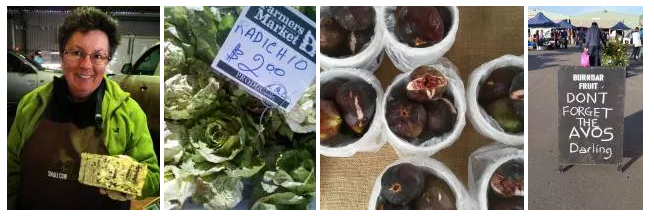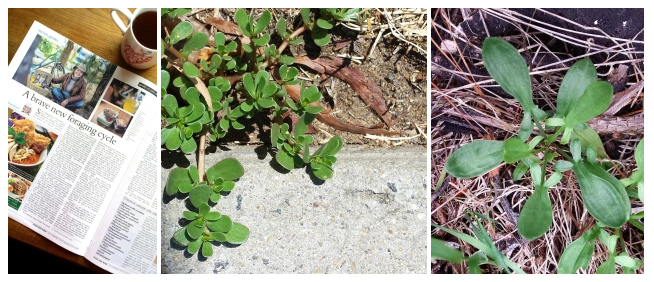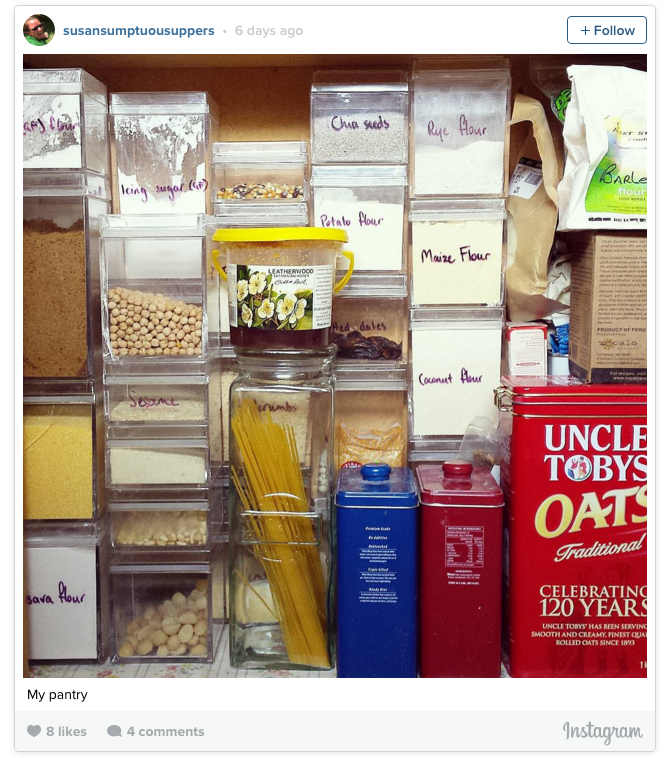Can you cut 1 Tonne of carbon pollution out of your life?
Take the challengeThe following is a guest post from 1 Million Women community member Susan Hutchinson. Susan is a PhD student at the ANU and a blogger who's passionate about food ethics and sustainability.
My year without Coles or Woolworths
I don't much go into New Year's resolutions, but this time last year a friend of mine suggested I resolve to not spend a single dollar at Coles or Woolworths for the entire year. Given my view of these two monolithic stores, and my food ethics, it was a challenge I wanted to accept. The year is almost done and I'm now taking the time to reflect on how I achieved the challenge.
The greenhouse emissions of the transport system that takes fresh food and other grocery items from their country or place of origin, to a wholesale market, to a warehouse, trucked to a grocery store, and sometimes onto a second or third store are huge. Products criss-cross the country, and sometimes the world. If you try buying a locally grown mango in Darwin, and it will have been shipped to the wholesale market in Brisbane, before being trucked all the way back to Darwin for retail sale. Then there's the food miles of importing foods like garlic (commonly imported from China), lemons (often from the USA) or asparagus (from Peru) into that system for them to be bought to you in the off season. On top of that, there's the hydroflurocarbons (HFCs) and hydrochloroflurocarbons (HCFCs) used in the refrigeration of all that food throughout its journey. Many of these chemicals are potent greenhouse gases. HCFCs also deplete the ozone layer. HCFC-22 is the most common refrigerant in Australia.
I also have social concerns with both businesses. Farmers have been complaining about unfair prices for produce, and unreasonable contract requirements for years. The $2 milk wars were a very visual example of some of these practices, but similar complaints have been made by vegetable producers including those producing potatoes and onions. Indeed, in 2013, the Australian Competition and Consumer Commission undertook an investigation of the major supermarkets. They began with over 160,000 complaints, took a deeper look at over 3,000 of those and commenced about 550 individual investigations. Around 140 of these progressed to in-depth investigations, resulting in more than 30 court proceedings, over 30 court enforceable undertakings, and the payment of numerous infringement notices. Most recently, the watchdog launched major legal action against Woolworths for unconscionable conduct toward suppliers. In November and December last year, it is alleged that Woolworths developed a strategy to demand payments totalling $18.1 million from its suppliers simply to increase the supermarket's profit margin.
Woolworths is also the largest owner and operator of high loss poker machines in the country. The majority of these machines are located in low-socio-economic neighbourhoods. Responding to recent government calls to reduce harm of poker machines, Woolworths took the opposite approach, facilitating and exacerbating the behaviour of addicts.
FRESH FOOD
Before the challenge began, I already bought the majority of my fresh food from my local farmers market. This resolution meant that I needed to better plan my food needs, so I didn't need to dash to the shop for just that one thing to make dinner complete. The market is a cash only (pretty much) zone, so I go with my $50 and get all my fresh food for the week. I can also get locally grown dried chickpeas, rain fed rice and rice flour and olive oil. I know the name of the person who produced every item in my market bag each week and that's a great feeling. It is the polar opposite of the Woolworths/Coles shopping experience. I buy locally produced, gold medal winning, free range eggs; heritage beef; biodynamic lamb straight from the farmer; delicious free range poultry; high quality cheeses; locally produced and bottled Jersey milk from a family business; seafood from people who own the boat, catch the fish, and bring it to market for me to buy. I buy the freshest, tastiest vegetablesfrom organic and 'conventional' farms within 200 kilometres of my home.

Images: Susan Hutchinson
I recognise how lucky I am to have such a good quality farmers market so close, on such a regular basis. I firmly believe that weekly farmers markets are the way to change people's shopping behaviour, with this regularity there is a viable shopping alternative that can be relatively easily incorporated into a routine. A fortnightly market may be OK, but a monthly market will only lead to specialty and luxury items that people might buy for a treat. A monthly market does not provide a serious alternative for daily food items. I urge market organisers, and communities considering the beginning of a farmers market to plan for a weekly market, containing as much locally produced food as shoppers would reasonably consume within the seasons.
I would highly recommend upcoming markets look for inspiration from the Capital Region Farmers Market. They take great effort to get good variety of produce so that it is possible for shoppers to buy all their food there each week. This does not mean that everything on offer at the supermarket is available at the farmers market, but with due consideration of seasonality and what actually grows in the region, you can easily buy food for a balanced, healthy diet.
In spring and summer I also do a lot of foraging for wild greens, edible weeds and a variety of fruits that I eat fresh and preserve. There's not much better than walking downstairs to the nature strip to pick some purslane, wild brassica or sheep sorrel to go in your salad. It's far tastier than shop bought greens, packed with nutrition, and doesn't cost a cent. It's also a wonderful excuse to get into nature and relax outside. It's certainly a superior experience than a peak hour visit to the supermarket.

Images: Susan Hutchinson
DRY GOODS
I buy my flour, nuts and dried beans from my local food co-op. The prices are very reasonable, the range is quite extensive and there are a lot of organic options. The co-op is on my bike ride from home to my office. I take my clear cubes and reusable tins into the store and weigh the containers before filling them up. If you volunteer your time once a month, you get a reasonable discount on your shopping items. They have a good supply of other local fresh produce including fruit and veg, vegan cheeses, tofu and fermented foods. They also have bulk liquids like honey, vinegars, and molasses that you can pour into your own reusable jars and bottles.

Images: Susan Hutchinson
HOUSEHOLD PRODUCTS AND TOILETRIES
I buy most of my cleaning products, soaps, shampoo, toothpaste and such from my local IGA. I am happy to buy items from them because the store is walking distance from my apartment, the service is friendly and personal, and I prefer to support independent and family owned/operated business. IGA stores are always stocked with items that are reflective of the locals and the owners, providing a community feel that I prefer to the nationwide grocery chains. While IGA still has some power of collective purchasing, stores have more flexibility to buy from local suppliers and don't have the same power to force unreasonable expectations on suppliers.
I buy my household cleaning products, including soap powder, dish detergent and shower cleaner from IGA. Although, I have just started replacing my shower cleaner with a natural vinegar solution. I often use bi-carbonate of soda for cleaning items such as the stove top, but I buy that from IGA too.
I buy all my laundry products from IGA. I use Aware soap powder to wash my clothes, it comes in a recycled cardboard box, is good to use in a front loader, and is free of the optical brighteners that fade coloured fabrics over time. I have however, discovered that my local food co-op sells bulk laundry detergent, which I may start to use instead of the boxes I buy at IGA. I buy a eucalyptus based wool wash by Earth Choice and the very occasional block of Sard soap for hand washing stubborn stains and grime out of whites.
Shampoo and conditioner were the hardest items for me. I like to buy in large containers, to minimise the packaging I'm responsible for. I like to use a silicon and paraben free shampoo. My IGA doesn't stock the 'natural' version of the brand I like to use. In Canberra, we are lucky have a third supermarket chain, Supabarn. Supabarn does stock my Tresemme shampoo, but the stores are entirely out of my way. This has led me to consider changing brands, to a more 'natural' gentler shampoo that is available at my local chemist. The bottles are not available in as large a size as my Tresemme products, but they are organic, made in Australia and smell great.
I buy my shower soap from the farmers market. I love that the market rules only allow food and fresh produce stalls, but several of the olive producers have been allowed to sell olive oil soap alongside their other products. I buy a bar of olive oil soap produced by Homeleigh Grove just on the outskirts of Canberra. It has minimal packaging, is lovely and gently on the skin, and I personally like the people who produce it. I also buy the mini soap bars to put on the towel of my AirBnB guests, as a personal little, local touch.
I recently watched a great little video about how much change you can bring to the world by changing your own behaviour. It makes such a difference. Not only are you reducing your negative impact on the world, by choosing a better way, buying into better, more ethical and sustainable systems, you are making a constructive difference. You are modelling that positive behaviour to your friends and community, and supporting others who are working and living in similarly positive systems.
Will you give it a go this coming new year? Can you do a year without Coles and Woolworths? I would not be surprised if you find it as enjoyable as I did.
If you'd like to read more about the food portion of this shopping challenge, you can head over to my food blog: Susan's Sumptuous Suppers.
You can also follow Susan on Instagram and Twitter: @SusansOpine
This piece originally appeared on ISHO
Banner Image: Shutterstock
All other images: Susan Hutchinson
Read this next: How to live a zero-waste life
Read this next: Katie Johnston diverts waste from landfill and by upcycling it into beautiful handmade jewellery
